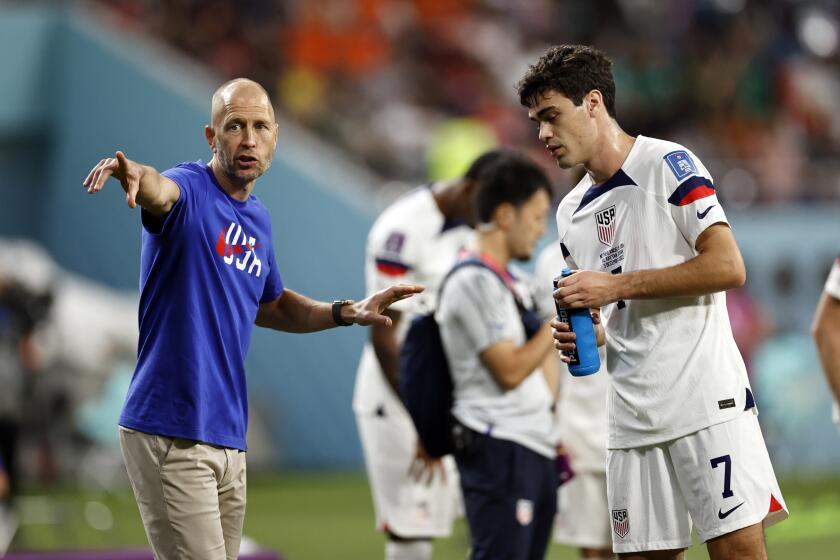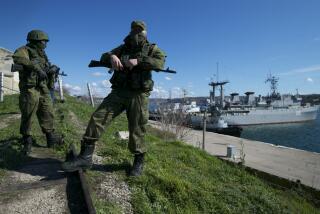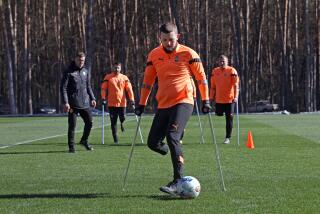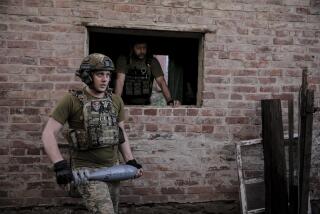Commentary: As Russia continues to kill and maim in Ukraine, FIFA and UEFA look the other way
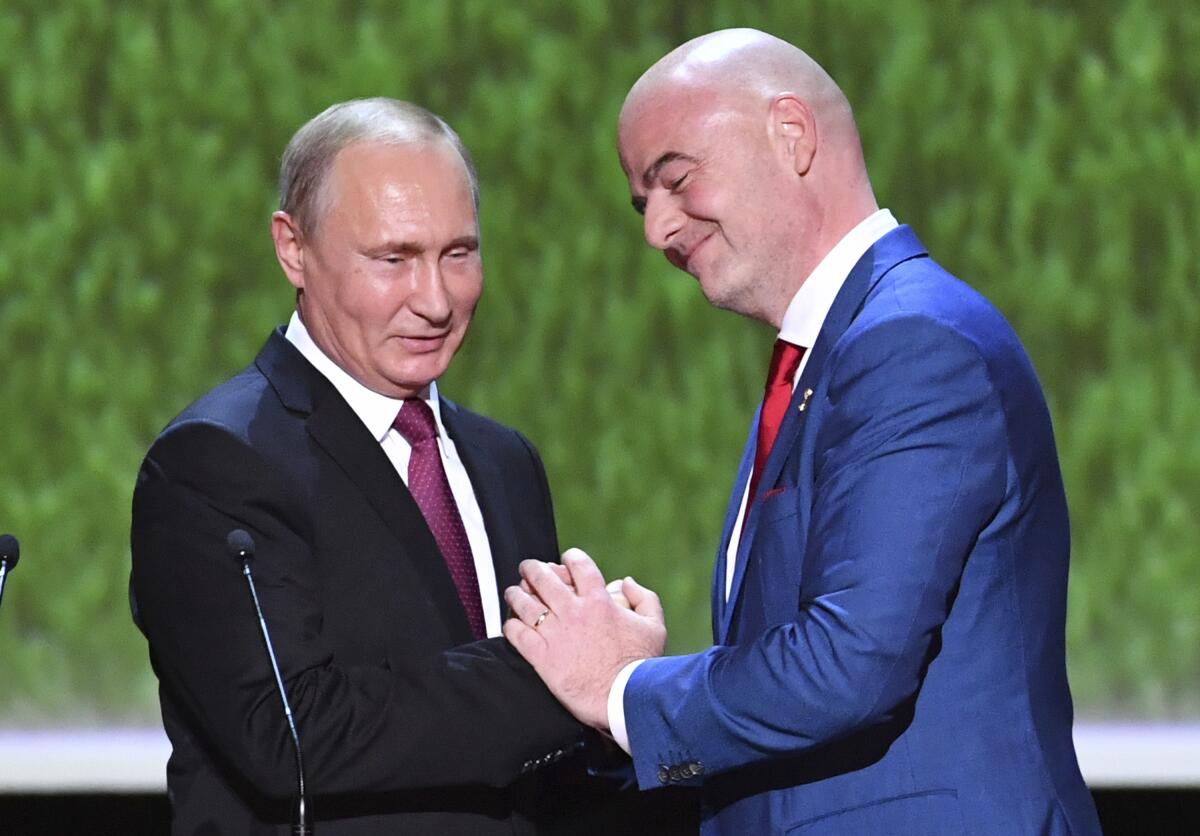
- Share via
FIFA, global soccer’s governing body and arguably the most powerful sports organization in the world, announced this week it was lifting a ban that kept Russian teams from participating in international competitions, clearing the way for the country’s men’s and women’s teams to take part in their respective U-17 World Cups.
FIFA’s decision came a week after the executive committee of UEFA, European soccer’s governing body and one whose influence in the sport is eclipsed only by FIFA, moved to lift its own boycott of Russian teams, imposed after the country’s 2022 invasion of Ukraine. Russia celebrated the announcements Thursday by sending a missile into a cafe and grocery store in a tiny village in the Kharkiv region of eastern Ukraine, killing at least 51 civilians.
The fact that the missile strike came just hours after FIFA’s announcement is a grim and timely reminder that Russia does not yet deserve to be allowed to play with the rest of the world.
USMNT coach Gregg Berhalter and midfielder Gio Reyna appear ready to put a feud behind them, with Berhalter calling Reyna up for October friendlies.
The lifting of the bans is in many ways more symbolic than effectual. On the men’s side, Russia hasn’t won a European title in a decade and has qualified for the U-17 World Cup just twice since 1987. Its women’s team has never qualified for either event. But then the ban was largely symbolic as well, issued as both protest and condemnation of an unprovoked invasion of a neighboring country that has killed nearly 10,000 civilians and leveled dozens of cities.
The idea that international sport is a place where sportsmanship and fair play rule the day is hopelessly naive and outdated when that world is awash in cheating scandals involving performance-enhancing drugs and gambling, corruption and bribery. But it’s still an ideal worth striving for, and at its very core is the concept that competing on the highest level is a privilege not a right. It requires the acceptance of certain rules and responsibilities, and Russia’s decision to launch the largest European conflict in eight decades clearly violates those norms.
Even FIFA would seem to agree, since the announcement it was lifting its Russia ban came in a written release, not at a news conference, where its president, Gianni Infantino, would have been forced to defend it. In some ways UEFA may have forced FIFA’s hand with its move last week to make Russian teams eligible to compete in the next U-17 men’s and women’s European Championships. Because those events serve as the continent’s qualifiers for the respective U-17 World Cups, FIFA was cornered and had to decide whether it would allow qualified teams to take part in its tournament.
The lifting of the UEFA ban is limited and provisional, covering only age-group teams; Russia’s senior men’s and women’s teams are still ineligible for international competition. And the U-17 teams must compete as the Football Union of Russia, without their national flag and anthem and in neutral kit colors.
The former baseball stadium that hosted the Lancaster JetHawks is poised to host a USL-affiliated pro team that could help revitalize the high desert.
That’s really a distinction without a difference, though. Because of widespread doping scandals, Russian athletes have competed in recent Olympics under the Russian Olympic Committee’s flag, yet those athletes were widely recognized and identified as Russians and those who medaled were welcomed home as national heroes.
By backing UEFA, FIFA made the wrong call. But then we’ve come to expect that from a scandal-ridden organization that took its last two World Cups to Russia and Qatar, two places where human rights — and political dissidents — are not tolerated.
This time, however, it was quickly called out for its decision, with Denmark, England, Finland, Ireland, Latvia, Lithuania, Norway, Ukraine and Poland all reportedly announcing they will boycott matches with Russian teams, regardless of what flag the team plays under.
“No representative Ireland teams, at any age group, would play against any team from Russia in any competition at the present time,” an Irish federation spokesperson told the Irish Independent after the federation board voted unanimously in favor of a boycott.
Jakob Hoyer, head of communications for the Danish Football Assn. (DBU), said, “We are not going to see a Danish national team against a Russian national team,” while Sweden, which is scheduled to play host to the women’s Under-17 European Championship, promised it would not allow Russia to compete in the tournament if it qualified.
Karl-Erik Nilsson, the former president of the Swedish Football Assn., is UEFA’s first vice-president, and DBU President Jesper Moller Christensen is a member of UEFA’s executive committee, suggesting just how divisive the issue of lifting the ban has become for the European confederation.
For players on the Wrexham women’s soccer team, pursuing a passion for the game can mean taking up job as a prison guard or a dishwasher to make it work.
Whether Russian athletes will be allowed to compete as neutrals at next year’s Paris Olympics will be discussed by IOC next week, but other sports governing bodies, such as the International Gymnastics Federation and the World Tennis Assn., have lifted or will soon lift bans on Russian athletes, allowing them to compete as “neutrals.”
Soccer, however, is different. Athletes in tennis and track and field, it can be argued, are representing themselves. Why punish them for what their government is doing?
In team sports that isn’t true. The players are representing a collective, be it a club or a country. And if that country is a pariah state, its representatives shouldn’t be allowed to play with the rest of the world.
In announcing last week’s decision to lift its ban on Russian youth teams, UEFA said that “children should not be punished for actions whose responsibility lies exclusively with adults.” The ban, it added, “deprived” the youth teams of their right to compete in international play.
On Thursday, Russia’s missile strike deprived a 6-year-old Ukrainian boy of his life. As long as that continues, so should the ban on Russia’s soccer teams.

